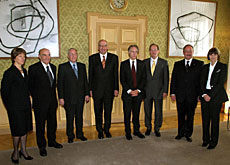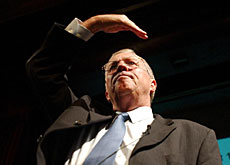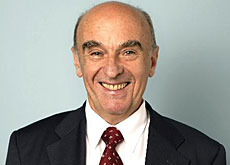Blocher victory overturns old order

The Swiss government has moved to the right after Christoph Blocher, the populist figurehead of the rightwing People’s Party, won a seat in cabinet.
Blocher replaces the Christian Democrat justice minister, Ruth Metzler, shifting the balance of power for the first time in 44 years.
Hans-Rudolf Merz of the centre-right Radicals was elected to replace Kaspar Villiger, who is retiring as finance minister.
Blocher’s success changes an informal power-sharing arrangement among the four main political parties – known as the Magic Formula – which has been in place since 1959.
Parliament’s election of Blocher, a member of the House of Representatives and a billionaire businessman, as well as Merz, a senator and business consultant, leaves just one woman in the cabinet.
Move to the right
Wednesday’s election marks a clear move to the right for Switzerland’s consensus government, in which the Social Democrats, Christian Democrats, Radicals and Swiss People’s Party share power.
With Blocher’s election, and the re-election of Defence Minister Samuel Schmid, the People’s Party has increased its representation in cabinet from one to two seats.
The rightwing party demanded a second seat after it emerged as the biggest party in October’s parliamentary elections.
Blocher, who narrowly defeated Metzler after three rounds of voting, said at a news conference after the ballot that the biggest challenge was to improve public finances and promote economic growth.
The Swiss Business Federation, economiesuisse, welcomed the election of Blocher and Merz, saying the country now had a real opportunity to implement reforms. This view was echoed by Switzerland’s bankers.
“Given the importance of the Swiss financial sector, we expect the newly-elected Federal Council [the cabinet] to maintain continuity in its policies and to robustly defend and promote the interests of the Swiss financial services industry both at home and abroad,” James Nason, spokesman for the Swiss Bankers Association, told swissinfo.
Concern and protest
Trade unions and centre-left politicians said they were concerned about a polarisation of society as a result of two conservatives being elected to the cabinet.
They criticised Blocher and Merz for demanding public spending cuts and a reduction in social security payments, as well as raising the retirement age.
Several centre-left parliamentarians questioned Blocher’s apparent willingness to seek compromise in the cabinet.
Several hundred people staged a protest against the two new cabinet members outside the parliament building in the capital, Bern, and criticised the fact that only one woman remained in the government.
Political analyst Jeremias Blaser from Fribourg University said the unseating of the justice minister, Ruth Metzler, was proof of a shift to the right.
“Rightwing parties have never pushed for equal representation of men and women in politics,” Blaser told swissinfo.
On the international stage, the European Union said it hoped to be able to cooperate with the new government to resolve outstanding issues and step up bilateral relations. However, it refused to give further details.
Life after government
Metzler is the first Swiss cabinet minister in 131 years to be forced out of office. Responding to her failure to win re-election, Metzler said she accepted parliament’s decision, but added that she was sad to have to give up her work.
She joined the government in 1999 and has served as justice minister. Her party colleague, Economics Minister Joseph Deiss, was confirmed in his cabinet seat and is now the only Christian Democrat in the seven-member government.
The members of the new cabinet, which will take over in January, are: Moritz Leuenberger (Social Democrats, transport ministry); Christoph Blocher (People’s Party); Joseph Deiss (Christian Democrats, economics ministry); Pascal Couchepin (Radicals, interior ministry); Samuel Schmid (People’s Party, defence ministry); Micheline Calmy-Rey (Social Democrats, foreign ministry) and Hans-Rudolf Merz (Radicals).
The cabinet will meet next Sunday for its first session to discuss the portfolios of the newly-elected ministers and a possible reshuffle.
Deiss was also elected president for 2004, a largely ceremonial position which rotates annually among the cabinet members.
swissinfo, Urs Geiser
The newly elected Swiss cabinet:
Moritz Leuenberger (Social Democrats)
Pascal Couchepin (Radicals)
Christoph Blocher (People’s Party)
Joseph Deiss (Christian Democrats)
Samuel Schmid (People’s Party)
Micheline Calmy-Rey (Social Democrats)
Hans-Rudolf Merz (Radicals)

In compliance with the JTI standards
More: SWI swissinfo.ch certified by the Journalism Trust Initiative



You can find an overview of ongoing debates with our journalists here. Please join us!
If you want to start a conversation about a topic raised in this article or want to report factual errors, email us at english@swissinfo.ch.